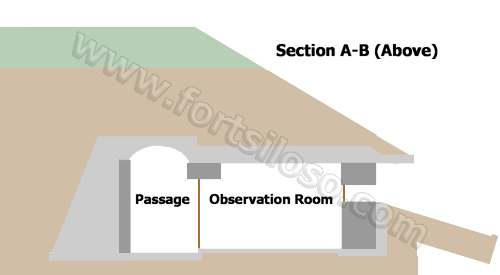Fort Siloso: Submarine Mining Station

Submarine Mining Station

From: Report on defences of British coaling stations abroad
and of Colonial
and Indian defended ports, 1894.
“The French Naval Coal Store” was on Pulau Brani

Plan view of the submarine mining Station
 From: Submarine Mines and Torpedoes
From: Submarine Mines and Torpedoes
as Applied to Harbour Defence 1889
The Personnel and the Stores.
The organization and superintendence and designing required for submarine mining are performed in our service by the officers of the Royal Engineers, who are frequently expert boatmen, and who, from their high educational attainments, are easily trained in the scientific portions of the work. It is rather hard upon them, for experience shows that it practically destroys their chance of seeing active service in the field. As for the men it is impossible to give any sound reasons for employing our most expensive and, under many conditions, our most useful soldiery in this manner. Our small force of Royal Engineers would be urgently required at the front in the event of a war of such magnitude that our harbours would have to be mined. The same argument applies with equal or greater weight to our Navy, and to less extent to any other portions of our fighting forces.
For this reason, if for no other, it is important that civilians should perform all the services possible which are connected with harbour defences. Submarine mining is certainly one of them. An attempt is being made at some ports to employ the Volunteers as miners, and no pains should be spared to insure success if possible, but the results to date are not encouraging. It is not a popular service with them. It is rather cold, wet, and dirty work with very little soldiering about it. Much of it is very like oyster dredging with more tallow, tar, and twine. Only a small proportion of the men are required for the scientific arrangements connected with the electrical gear. After an experience extending over a number of years I am convinced that most of the work can be properly and economically performed by civilians under the superintendence of trained officers.
At Singapore and Hong-Kong, Malays and Chinese boatmen, who cannot speak the English language, and who are only instructed for short periods annually, have been employed with satisfactory results; the work being directed by a small nucleus composed of highly-trained regulars. Much more then should civilians and volunteers at home be able to act in a similar manner, but the nucleus should be composed of men permanently employed at each port.

The Submarine Mining Station from the Surface
The ladder to the right is from the 1930s







